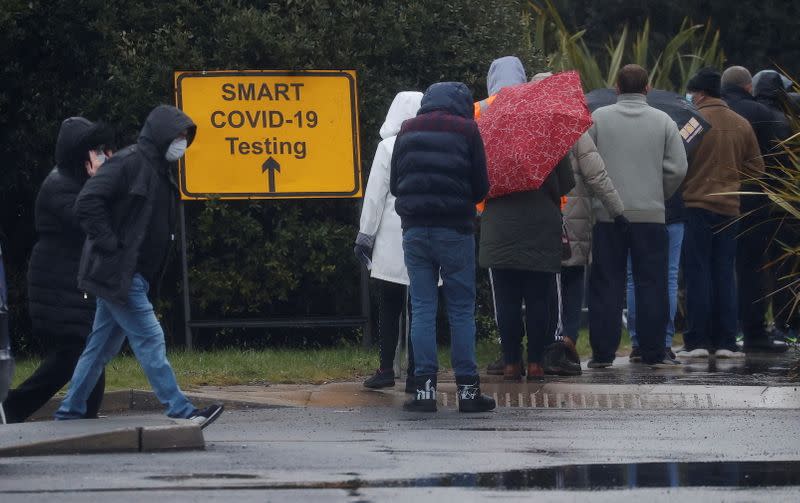By Estelle Shirbon and Alistair Smout
LONDON (Reuters) – The coronavirus mutation “of most concern” that could affect the vaccine’s efficacy has occurred spontaneously in the UK variant, said a professor of outbreak medicine who is on a panel advising the UK government on Tuesday.
The E484K mutation, which occurs on the virus’s spike protein, is the same change observed in the South African and Brazilian variants that has caused international concern.
Several laboratory studies have shown that vaccines and antibody therapy are less effective against the South African variant.
In contrast, early evidence showed that vaccines worked just as well against the British variant, called B.1.1.7, which did not originally have the E484K mutation.
“The most concerning mutation, which we call E484K, has also occurred spontaneously in the new Kent species in parts of the country,” Calum Semple, a member of the Scientific Advisory Group on Emergencies, said on BBC radio, referring to the Southern England province where the British variety was first discovered.
Concerns about the South African variant have prompted authorities in England to initiate a massive door-to-door test drive targeting 80,000 people living in areas where cases of the variant have been found in people with no affiliation to South Africa .
The fact that the E484K mutation had occurred spontaneously in Great Britain had already been reported in a technical briefing published by Public Health England, but this had not been widely noticed outside scientific circles.
The report said the mutation was detected in 11 B.1.1.7 genomes, possibly as a result of “more than one acquisition event,” suggesting that the 11 genomes were not all linked together and the mutation may have occurred spontaneously on individual locations.
The name E484K, in layman’s terms, is like map coordinates. The number 484 is the exact location of the mutation, the letter E is the amino acid it originally was, and the letter K is the amino acid it was mutated to.
“Unfortunately, the lack of control over these different variants in the UK could lead to this population becoming a melting pot for several emerging SARS-COV-2 / COVID-19 variants,” said Julian Tang, a virologist at the University of Leicester.
(Reported by Estelle Shirbon and Alistair Smout; edited by Nick Macfie and Gareth Jones)
Originally published
